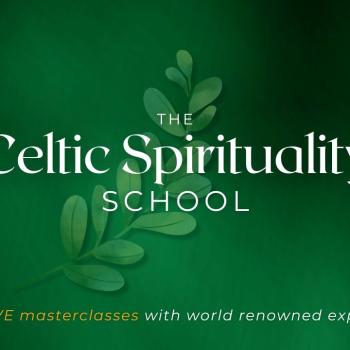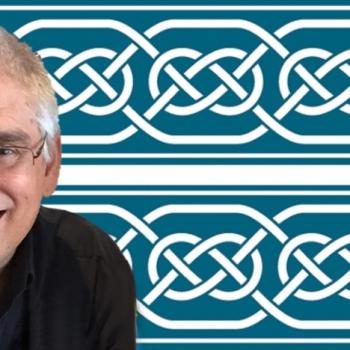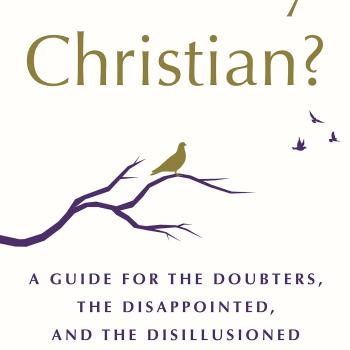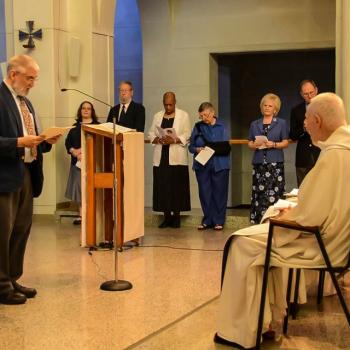
Recently I led a Celtic spirituality retreat through the Copper Beech Institute in Connecticut. During the retreat we talked about such topics as the spirituality of holy wells, thin places, and the concept of “the edge of waiting” as a Celtic way of contemplating.
One of the participants sent me an email after the retreat ended with a few questions that came to mind:
How do thin places/experiences intersect with the para-normal?
If a coincidence is “God being anonymous”, how does this relate to thinness?
You described a contemplative attitude as being “in waiting”. Where does discernment figure into this?
He gave me permission to answer these questions here on the blog, so here goes.
Thin Places and the Paranormal
A thin place, by its very nature, is a location where the veil between the material and spiritual realms seems, well, “thin.” Thin places tend to be sacred sites or places of natural wonder where people report feeling a sense of closeness to heaven and/or to the “otherworld” of Celtic legend and lore. Is this a subjective or objective experience? I’m not sure that anyone can really provide a definitive answer to this question, so I will assume that the thin place experience is subjective by nature: some people visit thin places and sense that closeness to the spiritual realm, while others might feel nothing extraordinary. As Elizabeth Barrett Browning reminded us:
Earth’s crammed with heaven,
And every common bush afire with God,
But only he who sees takes off his shoes;
The rest sit round and pluck blackberries.
It’s a mystery to me why some people “see” and take off their shoes, while others just keep on plucking their berries. But that’s how things roll. I imagine it has something to do with grace — the person who “sees” has been given a special gift — but also has to do with the disposition of the person: the one who sees is disposed to seeing. Just as the one who recognizes the presence of God in their hearts very often is the one who is open to such a knowing.

And the key word here is indeed knowing. This is an epistemological question: how do we know when we are especially present to the Mystery-with-a-capital-M, whether that means the presence of God, the realm of Spirit, or simply earth “crammed with heaven”?
My retreatant asks about the paranormal. In other words, is this a matter of clairsentience — like clairvoyance, only instead of the second sight, what’s at play here is a kind of “second knowing.”
I’m going to dodge the question, not because I don’t think this could be clairsentience — I see no reason why it couldn’t be — but because I just tend to opt for the most simple explanation. I think the kind of “mystical knowing” that recognizing a thin place entails does not have to be paranormal. In other words, it could be perfectly within the ordinary experience of average, ordinary human beings.
It’s a way of knowing, which doesn’t have to be a paranormal way of knowing (clairsentience) — but by the same token, it’s not your normal, linear left-brain mind’s way of knowing either. Thin places are recognized through intuition, through feeling, through attentiveness to silence and the subtle knowing of the human body. It’s what Maggie Ross calls the “deep mind” — or what Iain McGilchrist called the “master,” in contrast to the “emissary” which is the rational/linear way of knowing.
I think especially for those who are not used to listening to the deep mind, the intuitive sense of knowing that it can sometimes spontaneously offer up can certainly seem to be “paranormal” or clairsentient. But I don’t think it’s helpful to label something as extraordinary just because it tends to be something ignored by our mainstream ways of knowing. We need to become more familiar with intuitive knowing, and suggesting it is something exotic is probably not the best strategy.
By saying all this, am I suggesting that paranormal ways of knowing don’t exist? No, not at all. I believe in miracles, and in God anything is possible. But I also believe that the ordinary, everyday human being is more capable of deep intuitive knowing that we give ourselves credit. And if we can learn to set that intuitive side of ourselves free, many beautiful wonders will await us.
Coincidences, Thin Places, and the Hiddenness of God
I love this idea of “coincidence” being God acting anonymously. Although I prefer the word serendipity for this kind of heavenly dot-connecting.
I’m not sure that there is any special relationship to the thin places, however. Except maybe this: to recognize the serendipitous movement of the Holy Spirit in our lives requires the same kind of intuitive deep knowing that the ability to recognize a thin place requires.
In both cases, learning to live in wonder, to be friendly with silence and stillness and not-knowing, to accept paradox and ambiguity and to approach God in a spirit of deep trust — these are the raw materials for a way of knowing that is anchored in deep intuition, and it is this way of knowing that reveals both thin places and moments of serendipity to us.
Contemplative Waiting and Discernment
In the retreat, I described contemplation as “waiting” by pointing to the Irish word for contemplation, rinnfheitheamh, which literally means “at the edge of waiting.” How does this relate to contemplation? Consider this verse from Psalm 62: “For God alone my soul waits in silence.” (Psalm 62:1).
Now, then, how does discernment relate to the act of contemplative waiting? Discernment can be defined as the process of coming to spiritual insight or understanding, sometimes (but not always) with an eye to making a decision. Perhaps the key word here is process. While it is theoretically possible to discern quickly — akin to making a snap decision — my sense of the culture of Christian spirituality is that discernment is seen as a process that benefits from time. We need time to weigh different perspectives, to look at the ramification of different choices, to listen within for a sense of where the Spirit (or our heart) might be leading us.
Such a discerning process naturally takes time.
Therefore, I would say that whenever time and circumstances permit, contemplative waiting is discernment’s best friend.
If you are seeking spiritual understanding — or seeking guidance in making a decision, whether big or small — give yourself the gift of rinnfheitheamh — of taking time to pray at the edge of waiting. It will be worth the wait!
Carl McColman is the author of numerous books, including An Invitation to Celtic Wisdom and 366 Celt: A Year and a Day of Celtic Wisdom and Lore.
Enjoy reading this blog?
Click here to become a patron.














